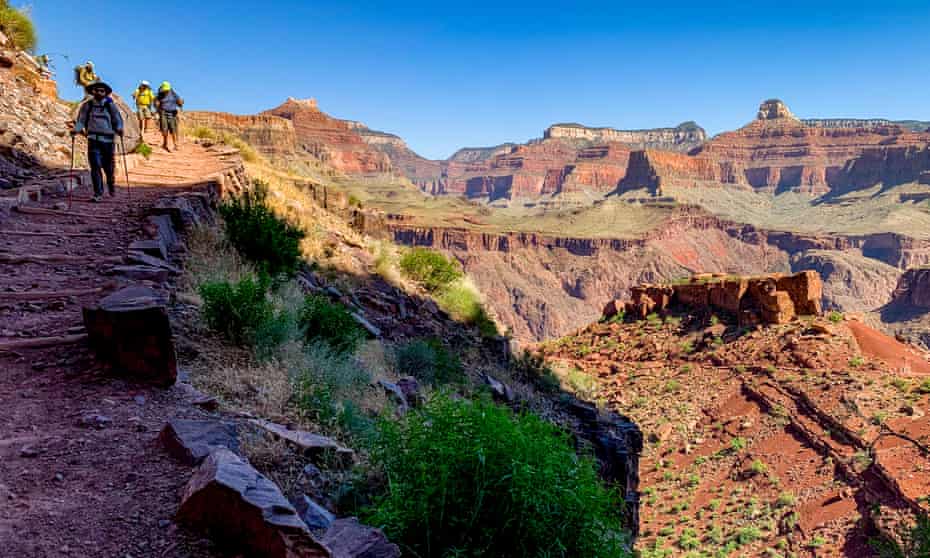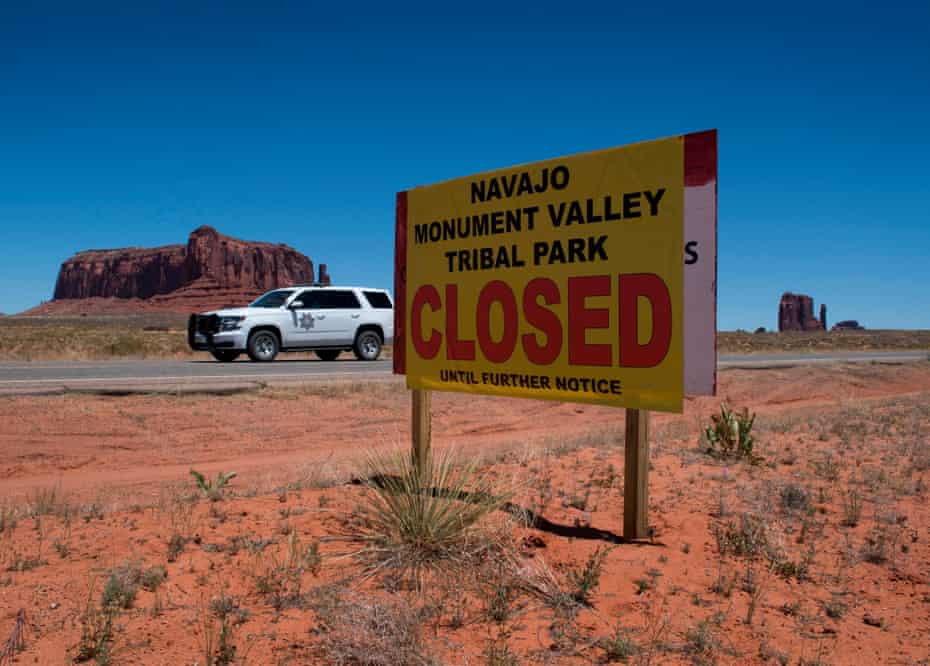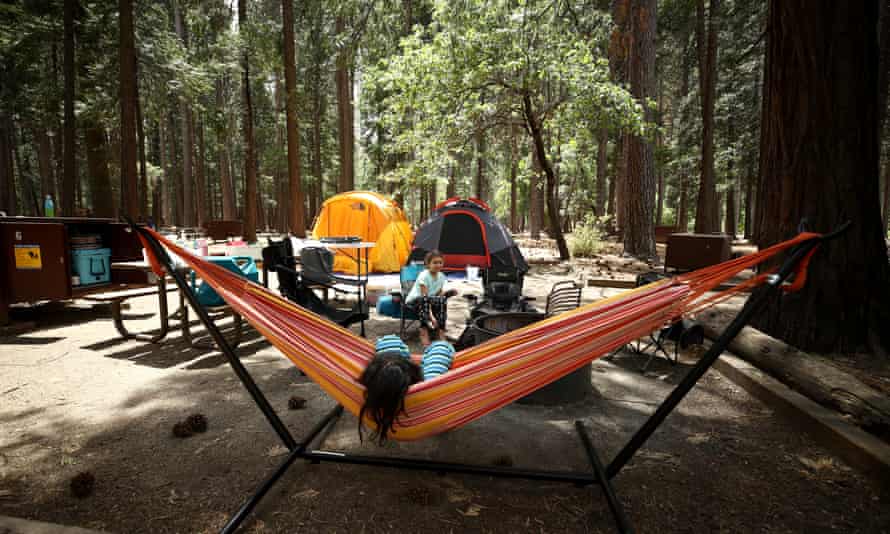Wanderlust and stolen land: how to mindfully explore the American outdoors

Tips for the socially and environmentally responsible traveler
Last modified on Sat 18 Sep 2021 22.34 EDT
In her book An Indigenous History of the United States, Roxanne Dunbar-Ortiz argues the US romanticizes outdoor travel to hide its colonial roots. Many Americans were raised on the belief that our heritage was wanderlust. Chasing “wilderness” was our right. But lost in this lore is the acknowledgment that our national park system was built upon stolen land.
As a travel writer, I believe deeply in our human nature to explore. But historically, the way we take advantage of our national parks has often caused harm: the genocide of Indigenous communities to make “space” for outdoor recreation, the unmanageable waste that accumulates from large crowds of tourists, the scarcity of resources for people living near parks.
The global spread of Covid-19 and the acceleration of climate change present even more ethical concerns: how do we balance our impulse to explore new horizons while also acknowledging the harm it may cause?
For tourists seeking to travel ethically to US national parks, here are tips to consider before planning your visit.
Research how the pandemic has affected local communities surrounding national parks
Many travelers faced criticism last year for recklessly visiting locations overwhelmed by Covid-19. This pattern of urban elites descending upon rural communities led to what University of Michigan professor Jean Hardy calls “disaster gentrification”: While outdoor destinations are presented as a place of “escape”, an influx of visitors may compound crises for local communities.
In Navajo Nation, parks remained closed due to Covid for far longer than others across the country. Kelkiyana Yazzie, an employee at Navajo National Monument in northern Arizona, says outside travelers often responded to closures and mask mandates with confusion and resentment without understanding how tribal communities were particularly hard hit.

“They’d make comments like, ‘I don’t understand why you are closed, you are out in the middle of nowhere, the virus can’t reach you there,'” Yazzie said. Last November, Yazzie lost seven family members to the virus over the course of two weeks, and knew many families on the reservation who had a similar experience to her own.
Travelers must be mindful of the unique strains caused by the pandemic – and adjust expectations accordingly. Recreate Responsibility, a network of outdoor leaders who compile resources on ethical travel, has an online toolkit on how to plan for park visits while also navigating Covid concerns.
“Your relationship to a national park starts before you show up at the trailhead,” says Eugenie Bostrom, a leader behind the group. “It begins with your understanding of every way you impact your surroundings.”
Consider alternatives to popular tourist destinations
Tourism at national parks has escalated dramatically in recent years, leading to overcrowding at popular attractions. In 2016 and 2017, national parks experienced the highest number of visitors ever recorded. The Disneyfication of national parks like Zion, Yosemite, Yellowstone and others created a new phenomena of visitors “loving our national parks to death.”
No matter how responsible any outdoor enthusiast strives to be, Bostrom admits “the land use is surpassing the ability to maintain the land itself.” When Bostrom spoke to leaders in the National Park Service, they said the best path forward is to “spread the love.”
“The federal government manages over 600 million acres of land across the United States. But only 80 million acres are national parks,” Bostrom said. “There are so many other options with the capacity to receive more visitors.”
Folks who crave hikes among the dramatic red canyons at Zion can instead visit other parts of Utah. The majestic alpine landscape of Yosemite can also be found in nearby national forests around California. Most federal land and national forests across the US allow dispersed camping, where travelers don’t have to book reservations in advance or pay money.

Seek out opportunities to acknowledge Indigenous communities
Before I begin any hike, I use a practice I learned from Indigenous environmentalists like Pinar Sinopoulos-Lloyd and Robin Kimmerer: introduce myself to land. This practice reframes outdoor recreation from an act that exploits land for our own benefit to a means of building a relationship with land by naming our intentions and expressing gratitude.
The practice can also include learning about the native communities who previously stewarded the land. At the beginning of your hiking or camping adventure, take a few minutes to ask yourself: what is this land’s racial and colonial history? What actions can we take now to repair the harm already caused?
Action guides can also help travelers contribute to Indigenous-led land trusts and other environmental projects that return the autonomy of stewarding land back to Indigenous leaders. (Indigenous communities control only about 2% of land in the United States.)
Travelers can also factor in this financial contribution as a “land tax” or “land reparations” payment in their national park vacation budget.
Explore ways to abandon the mindset of chasing after ‘pristine wilderness‘
After years on the road, I became more aware of how my own travels reinforced a colonial idea: if I searched long and far enough, I could find my own version of “untouched paradise”. We focus so hard on “leave no trace” while visiting a park, but then come home to our city lifestyles of hyperconsumption that ultimately leave a huge trace on the environment.
Now when I plan a trip, I remind myself that no stunning landscape can distract from the impact we have as humans on land every day – in and outside the parks.
Vasu Sojitra, a professional outdoor athlete, believes this is the core problem: the false binary we’ve created between “protected land” and the land we inhabit day-to-day.
“We’re always a part of nature,” Sojitra said. “Once we learn to be in a symbiotic relationship with land, we won’t need national parks, or ‘leave no trace’ principles, or even need to talk about ethical travel at all, because we’ll already be living with that mindfulness and consciousness in everything we do.”
.png)